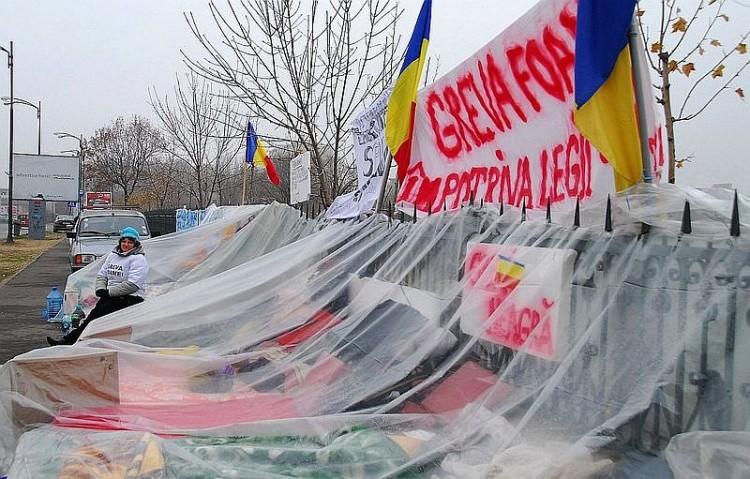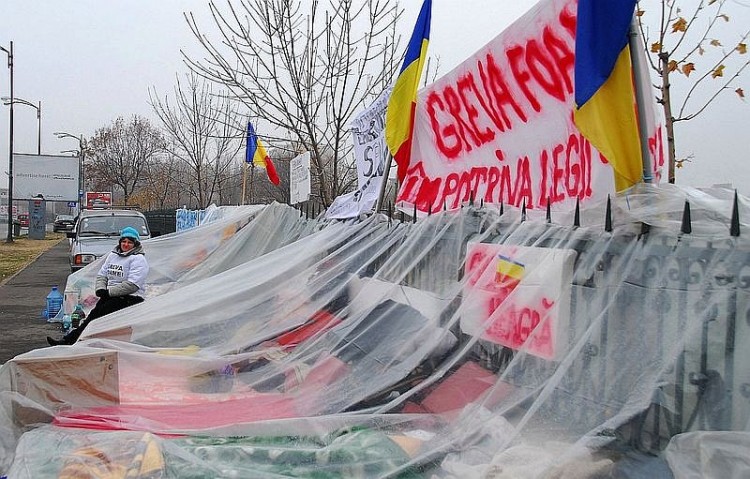BUCHAREST, Romania—In December 1989, city streets across Romania swelled with freedom fighters who risked everything, including their lives, to end communist rule. After they won the deadly confrontation, they were hailed as heroes and their sacrifices were rewarded with the Law of Gratitude in 2004 granting benefits to the fighters and families of the martyrs.
Today, some of those same men and women are in the streets again, this time protesting being stripped of their hero status and their benefits—tax breaks, incentives, and other grants—conferred on them under Law 341/2004.
Thirty-four former freedom fighters started a hunger strike in front of Parliament on Nov. 23, 2011. The strike was in protest of a law that aims to repeal a monthly supplement from the government, granted to freedom fighters earning less than the national average.
Despite the cold, the rain, and their sense of indignity over their treatment by the state, they have vowed to remain until their pleas are answered by President Traian Basescu.
“Our problem is that President Basescu condemned communism on paper in 2007, but we, the revolutionaries, are being penalized by the government. Moreover, all this time, former members of the Romanian Communist Party and criminals of the revolution are rewarded with pensions and salaries of tens and hundreds [of] millions [of] lei [hundreds to thousands of American dollars]”, said Cristina Adam, 42, an account and former freedom fighter.
The issue erupted back in July when Prime Minister Emil Boc, made comments widely reported in the media indicating that the benefits might be cut.
“Moral and material compensation must refer to concrete material repair, those who really were victims … those injured, must have priority from Romanian state,” Boc was quoted as saying.
At that point, the revolutionaries became alarmed, prompting the government to issue a press release on July 17, denying any changes were coming and promising wide consultation. Nevertheless, in October Parliament passed Law 410/2011.
Lumped in with Criminals
The revolutionaries complain that mass media in Romania has been conducting a concerted campaign against them and is now ignoring their current protests.
After the fall of communism in 1989, a pro-Kremlin government came to power under President Ion Iliescu who ruled for 10 of the next 14 years and then kept a Senate seat until 2008.
Iliescu was frequently criticized by the activists and in the mass media for awarding fake revolutionary certificates, oftentimes to profiteers, political affiliates, and protégées. Many former communist officials, informers, and conspirators also managed to receive Law of Gratitude grants.
Some of these fake revolutionaries were exposed in the media as informants and communists. But as a result, all revolutionaries became tainted in the eyes of the general public as profiteers, liars, informants, and impostors.
“They managed to mix us, freedom fighters, with criminals,” says Adam.
“The real revolutionaries aren’t profiteers, they are suffering from different diseases, and they are living on a minimum wage in the best case, or have small allowances. Many of them are retirees,” added Adam.
Unsolved Mysteries from 1989
In December 1989, mass protests brought down communist dictators behind the Iron Curtain mostly without bloodshed. In Romania, however, about 1,000 people were killed—mostly after dictator Nicolae Ceausescu and his wife had been executed—and many more injured by unidentified armed militias and snipers roaming Bucharest and several other major cities.
To this day, the revolutionaries have not been able to uncover the truth about the violence: Who shot at civilians and security forces even after Ceausescu’s regime crumbled and Iliescu had taken power?
No criminals have ever faced justice for the murders. Civil society’s many attempts to shed light on the enigma have been continuously blocked by the government.
To this day, only a small proportion of the files related to the communist period and the revolution have been made public or made available to researchers.
As Long as Necessary
As of Dec. 30, 2011, some of the hunger strikers, frail from nothing but liquids for over five weeks, began eating again. As of Jan. 3, only nine were still fasting but next week they expect more to come out again.
Their spirits have been bolstered by the fact that other revolutionaries have also begun hunger strikes in different cities across the country.
Another group is led by Teodor Maries, president of the December 21 Association, a rights group dedicated to defending freedom fighters. They began their peaceful protest in front of the Cotroceni Palace, the presidency headquarters, on Dec. 27.
Maries says they will continue into 2012 as long as necessary, until the Romanian leadership takes appropriate measures to uphold their rights and their dignity. Their fight isn’t about the money, he says, it about the principle.
“We want a law to get rid of the criminals who have infiltrated the revolutionaries, not [a law to get rid of the] benefits,” said Maries.




